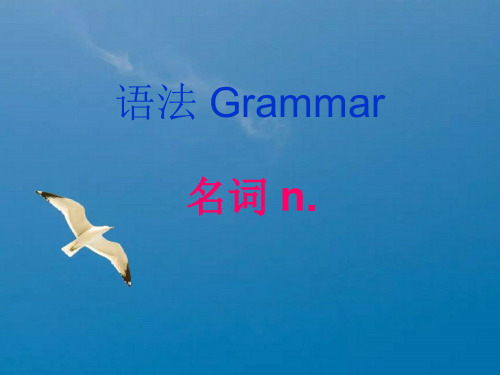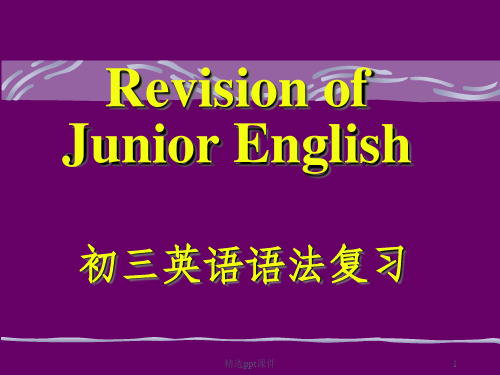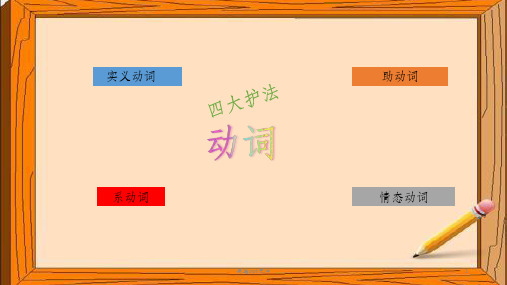初中英语语法复习课件免费下载ppt课件
合集下载
初中英语语法复习大全ppt课件

名词一切格:
1) 普通情况加 -’s: children’s books 儿童图书
today’s paper 今天的报纸
(2) 带词尾-s的复数名词只加 (’): girls’ school 女子学校 the Smiths’ car 史密斯家的小汽车
〔3〕留意以下情况: Tom’s and Jim’s rooms 汤姆和吉姆(各自)的房间 Tom and Jim’s room 汤姆和吉姆(共同)的房间
Canadian Canadians German Germans
2)变a为e:
Englishman Englishmen
Frenchman Frenchmen
3〕单复数同形:
Chinese Chinese Japanese Japanese
Swiss Swiss
Exercises~!
1. match _m_a_t_c_h_e_s___ 2. man _m__e_n_____ 3. German _G_e_r_m_a_n_s___ 4. tomato _to__m_a_t_o_e_s_
也就是短语里 面可数名词要 变复数的都变 复数哦~!
*可数名词也可以这样表达量,但要用复数方式:
a box of books five bags of apples
ten kilos of oranges
常用量词总结
a glass of 一玻璃杯 a cup of 一杯 a bottle of 一瓶 a bag of 一包,一袋 a box of 一盒;一箱 a piece of 一张(一片,块) a kilo of 一公斤;一千克 a basket of 一篮 a pair of 一对,一双,一副 a group of 一群,一队,一组
初中英语语法大全课件

(1)构成名词的后缀常用的有-ence,-(e)r/ -or (从事某事的人),-ese (某地人),-ess (雌性),-ful (一……),-ian (精通……的人),-ist (专业人员),-ment (性质;状态),-ness (性质;状态),-tion(动作;过程)等。例如: differ不同于→difference区别 write写→writer作家 Japan日本→Japanese日本人 act表演→actress女演员 mouth口→mouthful一口 music音乐→musician音乐家 racial种族的----racialist种族主义者
01
合成形容词
02
名词+形容词snow-white雪白的
03
名词+现在分词English-speaking讲英语的
04
名词+to+名词face-to-face面对面的
05
名词+过去分词man-made人造的
06
数词+名词one-way单行的
07
数词+名词+形容词two-year-old两岁的
动词转化为名词
很多动词可以转化为名词,大多意思没有多大的变化(如下①);有时意思有一定变化(如下②);有的与一个动词和不定冠词构成短语,表示一个动作(如下③)。例如:
Let's go out for a walk.我们到外面去散散步吧。
He is a man of strong build.他是一个体格健壮的汉子。
构成副词的常用后缀有-ly (主要用于形容词之后表示方式或程度),-ward(s) (主要用于表示方位的词之后表示方向)。
例如:
angry生气的→angrily生气地
to到→towards朝……,向……
初中英语语法复习-冠词PPT课件

6)用于固定词组 *half an hour *a moment ago * a lot of *have a rest *a little a few *a pair
a, an的位置
1. 一般放所修饰的名词前 a little boy, a computer
2. 放在half,many,such,what之后 half an hour such a good boy=so good a boy what a beautiful …
3)定冠词the用于序数词前或表示方位的名词前 和形容词最高级前
*the first *the best *in the south
4)乐器名称前用定冠词the
* play the piano * play the violin
5)在复数姓氏前加the,表示××一家人,
常看成复数
*The Browns are going to Shanghai for a
* They met here this morning.
* Each boy has a workbook.
4)一些专有名词、不可数名词、称呼、头衔 不用冠词
China Grade Two
Mr. Li Dr. Liu meat
5)表示颜色、语言、国家前不用冠词
* in purple * in red
2 Did you play ____/ ____ basketball or play __t_h_e____ piano after ___/____school? 3 Turn right at ___t_h_e___ third crossing on ___th__e___ left.
4 They got to ___th__e___ moon by ____/____ spaceship. 5 She is ___a_____ university student, she likes __th_e_____ music of __t_h_e____ film.
a, an的位置
1. 一般放所修饰的名词前 a little boy, a computer
2. 放在half,many,such,what之后 half an hour such a good boy=so good a boy what a beautiful …
3)定冠词the用于序数词前或表示方位的名词前 和形容词最高级前
*the first *the best *in the south
4)乐器名称前用定冠词the
* play the piano * play the violin
5)在复数姓氏前加the,表示××一家人,
常看成复数
*The Browns are going to Shanghai for a
* They met here this morning.
* Each boy has a workbook.
4)一些专有名词、不可数名词、称呼、头衔 不用冠词
China Grade Two
Mr. Li Dr. Liu meat
5)表示颜色、语言、国家前不用冠词
* in purple * in red
2 Did you play ____/ ____ basketball or play __t_h_e____ piano after ___/____school? 3 Turn right at ___t_h_e___ third crossing on ___th__e___ left.
4 They got to ___th__e___ moon by ____/____ spaceship. 5 She is ___a_____ university student, she likes __th_e_____ music of __t_h_e____ film.
初中英语语法复习--ppt课件

easy – easier – easiest
lucky – luckier – luckiest
精选ppt课件
10
规则变化
部分双音节和多音节词
在词前加 more 或 most
slowly - more slowly - most slowly
easily - more easily - most easily
*This problem is a little more difficult than the other one.
精选ppt课件
17
5)几种比较级的使用句型
1.“ 比较级 + and + 比较级 ”
表示“ 越来越······”
*Your English is getting better and better.
*He is the most careful among us.
精选ppt课件
15
3) 在表示 “和······一样······” 和 “不及······” 这类概念时,可以用 “as+原级+as” 和 “not as(so) +原级+as”的句型
*Our teacher is as busy as before.
3 He was so _s_u_r_p_r_i_s_e_d_ that he couldn’t believe this _s_u_r_p_r_i_s_in_g_ news. (surprise)
4 He won’t do it. I won’t do it, __e_i_th__e_r___.
(too)
越多越好。
*The busier he is, the happier he feels. 他越忙越高兴。
初中英语语法-动词复习(完整24张)ppt课件

将来时
Will you pass me the book? We will do anything thing for you.
They will have a meeting tomorrow.
would will 的过去式
Would you tell me the way to the
表示过去的意愿或委婉的询问 station.
3. —May I take this book out? —No, you___.
A. can't
B. may not C. needn't D. aren't
4 .You___ go and see a doctor at once because you're got a fever.
A.can
精选ppt课件
23
精选ppБайду номын сангаас课件
24
不及物动词无需接宾语
Mike is studying Maths. Mike studies hard.
有些动词既是及物动词又是不及物动词
精选ppt课件
5
有s些tu不dy及物动词与其他词构成短lik语e 时,作用相当于ke一ep个及物动词
turn off
learn
work
leave
pick up
swim
tastes 9. The mooncake ________good. 10. The meat __t_a_s_te_s___ bad.
精选ppt课件
12
护法三号 助动词
I was doing my homework all afternoon. Many trees are planted in the park last Sunday.
Will you pass me the book? We will do anything thing for you.
They will have a meeting tomorrow.
would will 的过去式
Would you tell me the way to the
表示过去的意愿或委婉的询问 station.
3. —May I take this book out? —No, you___.
A. can't
B. may not C. needn't D. aren't
4 .You___ go and see a doctor at once because you're got a fever.
A.can
精选ppt课件
23
精选ppБайду номын сангаас课件
24
不及物动词无需接宾语
Mike is studying Maths. Mike studies hard.
有些动词既是及物动词又是不及物动词
精选ppt课件
5
有s些tu不dy及物动词与其他词构成短lik语e 时,作用相当于ke一ep个及物动词
turn off
learn
work
leave
pick up
swim
tastes 9. The mooncake ________good. 10. The meat __t_a_s_te_s___ bad.
精选ppt课件
12
护法三号 助动词
I was doing my homework all afternoon. Many trees are planted in the park last Sunday.
初中英语语法专题课件完整版(共983张PPT)

2.不规则变化
构成方法
例词
形式不变 (单复数同形)
sheep-sheep deer-deer Chinese-Chinese Japanese-Japanese
变内部元音字母
foot-feet tooth-teeth goose-geese man-men mouse-mice
词尾加-en/-ren
a group of 一队,一组,一群
②还可用much,little,a little of,a large amount/deal of, no,plenty of等来修饰不可数名词,some,any既可修饰可数名词也可修 饰不可数名词。
much money,plenty of water a little of air some(肯定句): some milk ,some apples any(疑/否):Are there any stamps?I don’t have any money (5)数词-名词-形容词构成的复合形容词,中间的名词不能用
普通名词又可分为下面四类:
1)个体名词:表示单个人或单个事物。 如:gun、kid 、book。 2)集体名词:表示一群人或一些事物组成的集合体。 如:family。
3)物质名词:表示无法分为个体的物质、材料、食品、饮料、液体、气体、 金属等名称的名词,
如:pork、wood、bread、water、air。 4)抽象名词:表示动作、状态、品质、感情等抽象概念及学科、疾病。 如:work 。Hunger、honesty 、love、Chinese、success、HIV。 个体名词和集体名词可以用数目来计算,称为可数名词。
f,fe 为v,再加 -es
shelf-shelves thief-thieves
初三英语语法知识总复习PPT课件

作……看待
look around 朝四周看
look at 看着……
look up 往上看,仰望
look after 照管,照看,照顾
look for 寻找
look like 看上去像
look out of (outside) 往外看(看外面)
look up a word (in the dictionary) 查字典
2)非延续性动词现在进行时表将来。
第8页/共18页
Be动词(be, am , is , are, was, were, been,being)
其他系动词
一感:feel; 三变:become, get, turn 五起来:look, taste, sound,
smell, seem
第9页/共18页
系动词
用法: 其后应该 接形容词, 而不是 副词。
感官使役动词
一感:feel; 二听:listen to, hear (listen to 强调动作,hear指听得结果) 三让:make, let, have; 四看:look at, see, watch, notice; 一帮助:help
用法口诀:
to 在句中像妖怪, 主动句中它走开(动词原形), 被动句中它回来。
第1页/共18页
Ripple_Zhu
英语词性的分类及用法 重要语法讲解---宾语从句、定语从句、状语从句、 感叹句、反意疑问句 时态分析 重点词汇、短语复习
第2页/共18页
. 词性分类
名词 noun
代词 pronoun
冠词 article
介词 preposition
虚实 词词
形容词 adjective
get in 进入,收集
《初中英语语法》PPT课件

We know (that)we should learn from each other. Please tell me if/whether you have been to America. Could you please tell me where the restrooms are? 引导词是从句的一个成份,所以用哪个引导 词,看从句成份是 否完整,不完整,一定是特殊疑问句。完整,判断主句语气, 是疑问语气,用if/whether; 是肯定语气,用that.
2:用that, if/whether, how,where,what,….等连接词填 空.
that they will visit our school next week. 1.I hear_____
who the girl is? 2.Do you know_____ how can get to the park? 3.Could you tell me _____I 4.We thought ______you had never been there before . that 5.Please tell me_______ you live. where 6.Mother asked me ___________ I had finished my if/whether homework.
why 7.Do you know_____ she is angry? what 8.The teacher asked_____ your name was. how old
9.Tom is ten.I want to know _________ you whether are.
10.He asked you_______ you were a student or not.
- 1、下载文档前请自行甄别文档内容的完整性,平台不提供额外的编辑、内容补充、找答案等附加服务。
- 2、"仅部分预览"的文档,不可在线预览部分如存在完整性等问题,可反馈申请退款(可完整预览的文档不适用该条件!)。
- 3、如文档侵犯您的权益,请联系客服反馈,我们会尽快为您处理(人工客服工作时间:9:00-18:30)。
girlfriend – girlfriends grandchild – grandchildren (2) man,woman 构成的合成词,每个名
词都要变成复数
a man doctor – men doctors a woman teacher – women teachers
12
6.常以复数形式出现的名词
数名词复数
*There are a few people in the park. *How many knives are there in your pencil-box?
14
★不可数名词
物质名词和抽象名词属于不可数名词如: water,rice,fish,meat 等。
特别记住: work chalk time space music money weather cotton homework wood information news medicine
Revision of Junior English
主讲:王伟 江西师范大学英语培训中心
英语教研室
1
Nouns
名词
2
名词
表示人、事物、地点的 名称或者抽象概念的词 分为专有名词和普通名词
3
专有名词
表示个别的人、事物、地点等专 有的名称。专有名词第一个字母要大 写
* Lucy * China * the Summer Palace
10
3.变man为 men man – men woman – women policeman – policemen Frenchman – Frenchmen
请区别:German(德国人) – Germans 4. 其它形式
child – children mouse – mice
11
5.一些合成名词的复数构成分两种情况 (1)将中心词变为复数
* There are three banana trees over
there. 2.man woman用做定语时,应与后面的名
词保持数的一致
17
注意: 可数名词也可用量来表示, of 后用复数
* There are two bags of clothes over there.
* We have five boxes of apples.
18
4.有些可数名词或不可数名词在一定情 况下可相互转化,同一个词,但意思不同
(1) glass(玻璃)– a 工作) – a work(著作) room(空间) – a room(房间)
4
普通名词
分为可数名词和不可数名词 ★可数名词
表示人、事物、地点等的名称。 可数名词有单数和复数两种形式之分
5
名词的单数形式
一般可用a来修饰 * a car *a book 在元音发音开头的单词前用 an * an elephant
* an apple 请区别:a useful machine
6
15
1.不可数名词无复数,作主语时常看成单
数
*Some bread is over there. *No news is good news.
2.常用how much, much, a little, little, a lot of, some, any等来修饰不可数名词
*They had much money. *He does little housework at home.
(5) 以f、fe 结尾的名词,变f、fe 为v再加 “es” /vz/
* half – halves * shelf – shelves *knife – knives * leaf – leaves
9
2.特殊变化的单词 (1)单复数同形
Chinese – Chinese fish – fish Japanese – Japanese sheep – sheep (2)变元音字母oo为ee tooth – teeth foot – feet
名词的复数形式 1.复数形式的构成方法 (1) 一般在复数名词后加“s”/s/or/z/
* dog – dogs * book – books (2) 以s、x、ch、sh结尾的名词加 “es”/iz/
*box – boxes *watch – watches
7
(3)以辅音字母加y结尾的名词,变y为i加 “es” /iz/
* country – countries * factory – factories 请区别:如果是元音字母加y 结尾的名词 则只须加“s” * boy – boys * monkey – monkeys
8
(4) 以o结尾的名词加“s” /z/ * radio – radios * zoo – zoos 只有 potato tomato加“es”构成复数 potato – potatoes tomato – tomatoes
16
3.常用a piece of, a cup of, a glass of,a bottle of等来表示不可数名词的量,单复数 表现在of 前面的名词上,而 of 后始终是单
数
*There is a piece of paper in the book.
*Three glasses of orange are on the desk.
19
(2) fruit(水果) – fruits (各种水果) fish(鱼) – fishes(各种鱼) hair(所有头发) – hairs (几根头发) time(时间) – times(时代)
20
名词的一般用法 ★名词做定语
1.修饰另一名词时,一般用单数
* He has two pencil-boxes.
people clothes police
trousers
glasses
这些名词作主语时,注意它们的谓语用 复数
* My clothes are newer than yours.
* The police often come here.
13
7.可用how many,many,a few,few, any,lots of, some,a lot of 等修饰可
词都要变成复数
a man doctor – men doctors a woman teacher – women teachers
12
6.常以复数形式出现的名词
数名词复数
*There are a few people in the park. *How many knives are there in your pencil-box?
14
★不可数名词
物质名词和抽象名词属于不可数名词如: water,rice,fish,meat 等。
特别记住: work chalk time space music money weather cotton homework wood information news medicine
Revision of Junior English
主讲:王伟 江西师范大学英语培训中心
英语教研室
1
Nouns
名词
2
名词
表示人、事物、地点的 名称或者抽象概念的词 分为专有名词和普通名词
3
专有名词
表示个别的人、事物、地点等专 有的名称。专有名词第一个字母要大 写
* Lucy * China * the Summer Palace
10
3.变man为 men man – men woman – women policeman – policemen Frenchman – Frenchmen
请区别:German(德国人) – Germans 4. 其它形式
child – children mouse – mice
11
5.一些合成名词的复数构成分两种情况 (1)将中心词变为复数
* There are three banana trees over
there. 2.man woman用做定语时,应与后面的名
词保持数的一致
17
注意: 可数名词也可用量来表示, of 后用复数
* There are two bags of clothes over there.
* We have five boxes of apples.
18
4.有些可数名词或不可数名词在一定情 况下可相互转化,同一个词,但意思不同
(1) glass(玻璃)– a 工作) – a work(著作) room(空间) – a room(房间)
4
普通名词
分为可数名词和不可数名词 ★可数名词
表示人、事物、地点等的名称。 可数名词有单数和复数两种形式之分
5
名词的单数形式
一般可用a来修饰 * a car *a book 在元音发音开头的单词前用 an * an elephant
* an apple 请区别:a useful machine
6
15
1.不可数名词无复数,作主语时常看成单
数
*Some bread is over there. *No news is good news.
2.常用how much, much, a little, little, a lot of, some, any等来修饰不可数名词
*They had much money. *He does little housework at home.
(5) 以f、fe 结尾的名词,变f、fe 为v再加 “es” /vz/
* half – halves * shelf – shelves *knife – knives * leaf – leaves
9
2.特殊变化的单词 (1)单复数同形
Chinese – Chinese fish – fish Japanese – Japanese sheep – sheep (2)变元音字母oo为ee tooth – teeth foot – feet
名词的复数形式 1.复数形式的构成方法 (1) 一般在复数名词后加“s”/s/or/z/
* dog – dogs * book – books (2) 以s、x、ch、sh结尾的名词加 “es”/iz/
*box – boxes *watch – watches
7
(3)以辅音字母加y结尾的名词,变y为i加 “es” /iz/
* country – countries * factory – factories 请区别:如果是元音字母加y 结尾的名词 则只须加“s” * boy – boys * monkey – monkeys
8
(4) 以o结尾的名词加“s” /z/ * radio – radios * zoo – zoos 只有 potato tomato加“es”构成复数 potato – potatoes tomato – tomatoes
16
3.常用a piece of, a cup of, a glass of,a bottle of等来表示不可数名词的量,单复数 表现在of 前面的名词上,而 of 后始终是单
数
*There is a piece of paper in the book.
*Three glasses of orange are on the desk.
19
(2) fruit(水果) – fruits (各种水果) fish(鱼) – fishes(各种鱼) hair(所有头发) – hairs (几根头发) time(时间) – times(时代)
20
名词的一般用法 ★名词做定语
1.修饰另一名词时,一般用单数
* He has two pencil-boxes.
people clothes police
trousers
glasses
这些名词作主语时,注意它们的谓语用 复数
* My clothes are newer than yours.
* The police often come here.
13
7.可用how many,many,a few,few, any,lots of, some,a lot of 等修饰可
